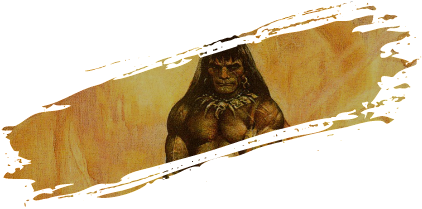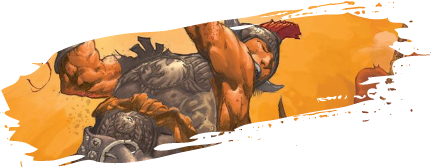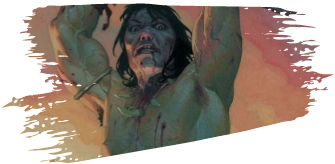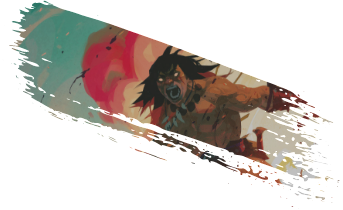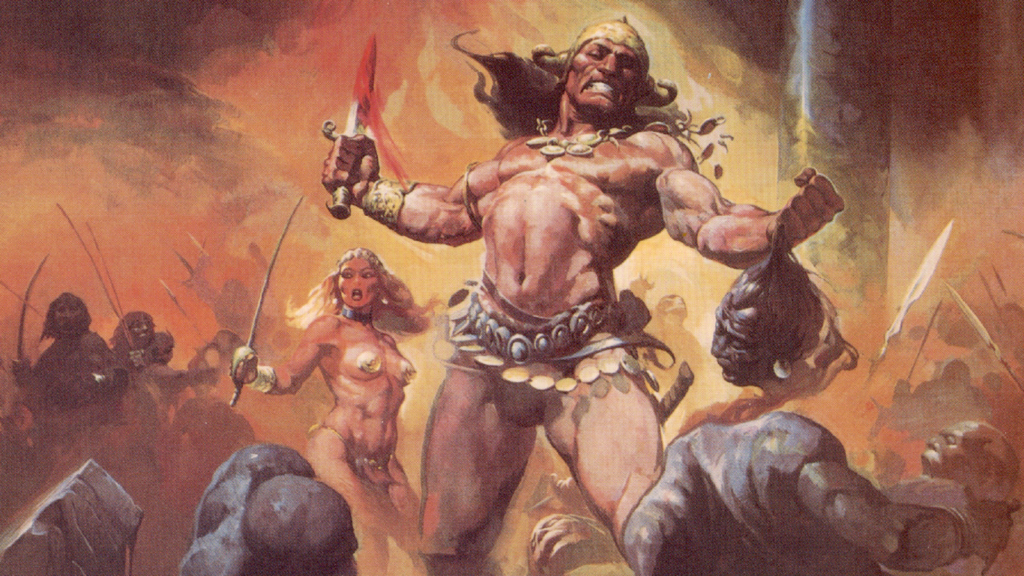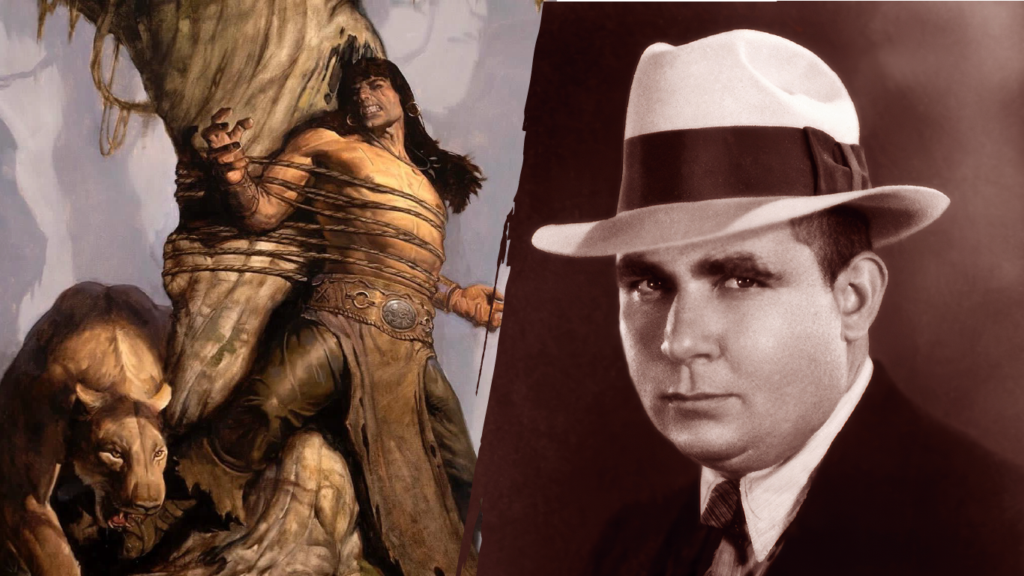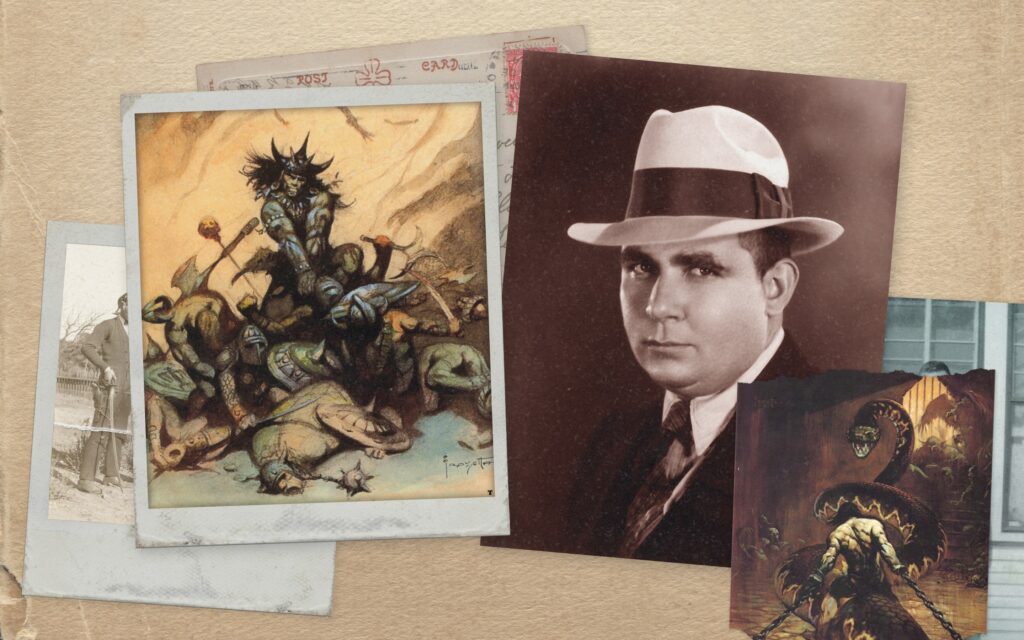
Robert E. Howard wrote many hundreds of stories over the course of his life, and hundreds of poems as well. It’s an amazing amount of work, given how young he died. It’s not possible here to examine an exhaustive list of his heroes and protagonists. Others far better qualified than this writer have done so in the past. What this article attempts to do is to look at some of the most developed and interesting of his literary creations.
Kull of Atlantis
The most chronologically distant of Howard’s major characters, Kull appears at first glance as just a clumsy initial version of Conan. He is, after all, a mighty barbarian wanderer who takes control of a civilized kingdom and bends it to his will. But unless you look past that gloss, you’ll completely miss the point of not only Kull, but of Conan as well.
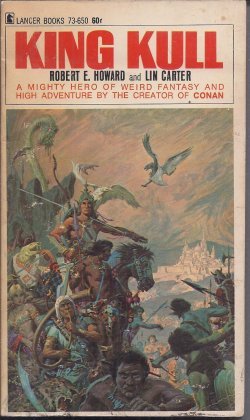
A hundred thousand years ago, Atlantis still stood above the waves, but most of humanity lived on the continent of Thuria, roughly equivalent to modern Eurasia. Little else of the world was above the waves. Kull was born in Atlantis’s Tiger Valley, but the land flooded while he was still young. Only some former mountains survived, as islands, and after a feral time, Kull was adopted into one of these sea-mountain tribes. After being banished, he spent an unsuccessful time as a pirate and then bandit, before being captured by the kingdom of Valusia and made to fight as a gladiator. He became famous and popular, eventually winning freedom as a soldier. He rose swiftly in the army, and the loyalty he gained there permitted him to overthrow the cruel, hated king and replace him.
The earliest story in Kull’s own timeline is “Exile of Atlantis.” A tribeswoman who had fled to marry into enemy tribe is shipwrecked in her home territory. The tribe decide to burn her at the stake. Kull is perplexed, and tries to help her, but the best he can do is grant her a swift death. Because of this, he has to flee for his life. By the time of the next story, he is established in Valusia. He considers the ancient kingdom decadent and hidebound, their laws petty and cruel. By the time of “The Shadow Kingdom,” he has replaced the previous king, and is forced to contend with constant conspiracy, backbiting, and the treat of assassination.
In the stories that follow, he devotes much of his time to defending life, throne, and kingdom from threats, often sorcerous. He has firm allies – the Pictish warrior Brule the Spear-slayer, and a cynical first councillor named Tu – and a dire enemy, the undead sorcerer Thusla Doom of movie fame. But alongside his adventures, he is also deeply concerned with matters of decency and fairness, particularly as they oppose the laws of civilisation. He forgives insults and treacheries, permits open rivals to live, reshapes laws to allow lovers to marry, and considers poets more worthy than kings. Life is a momentary dream, and kingdoms something to be tolerated, even his own. When a friend turns traitor, Kull’s regret is that the young man felt driven to such extremes. Despite his decency towards women, he has no interest in romance with either gender.
In Kull, Howard created the ideal expression of his values. Kull is a physical exemplar, strong and fast and with incredible resilience. He is free of the corrupting cruelty of civilization, having grown alongside animals in the wild. Although he places huge stock on his freedom, and is quick to slay those who raise arms against him, he is just and generous, and does not take his own power to heart. On the contrary, he deliberately weakens his apparent position time and again to do what is fair. He respects women, but does not inflict himself on them, even if they would be enthusiastic. He admires poets and scenes of beauty, sees life as a whimsy, and constantly wonders about its, and his, reality.
Kull is the man that Howard thought all men should be, the man he longed to be himself. However, to his regret, Kull just wasn’t a successful character. Howard wrote twelve stories and one poem about him, and was able to sell only three, all to Weird Tales. Conan exists precisely because of Kull’s failure, a direct reaction to the commercial rejection of his own personal creed.
Conan the Barbarian
“Between the years when the oceans drank Atlantis and the gleaming cities, and the years of the rise of the Sons of Aryas, there was an Age undreamed of, when shining kingdoms lay spread across the world … Hither came Conan, the Cimmerian, black-haired, sullen-eyed, sword in hand, a thief, a reaver, a slayer, with gigantic melancholies and gigantic mirth, to tread the jeweled thrones of the Earth under his sandalled feet.”
The Phoenix on the Sword, R. E. Howard.
It is somewhat ironic that for many people, Conan is synonymous with Robert E. Howard. The towering barbarian lived during the Hyborian Age, a period of romantic history which came between the destruction of Atlantis and the first traces of real historic civilisation. Although Howard never specified a clear date, signs in his work suggest this was meant to be shortly after the end of the last ice age, around 14,000 years ago.
Conan was a Cimmerian, a member of an early Celtic tribe who roamed the region north of the Black Sea. He was the son of a blacksmith, born on a battlefield, strong as a titan and already a savage warrior by the age of a fifteen. Wanderlust took him, and he began stalking the nations of the Hyborian Age, plundering and murdering his way as a thief, a bandit, an outlaw, a pirate, or a mercenary depending on the fortunes of the day. On the occasions when he agreed to serve under another man, he invariably proved himself a traitor, overthrowing the fellow to seize power. As his reputation grew, so did the number of men under his command, so his ambitions grew with them. Several times, his entire force was wiped out in some failed scheme, yet this did little to stop his rise. Eventually, in his forties, he overthrew the king of Aquilonia, the Hyborian Age’s most powerful nation, and seized the country for his own.
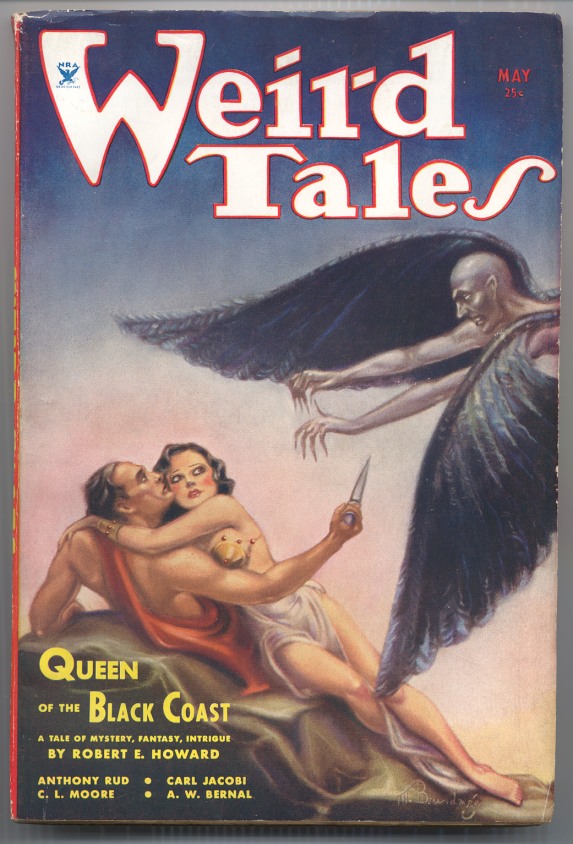
In modern terms, the Conan who Howard described in his stories is scum, a life-long murderer and criminal motivated almost entirely by selfishness. That’s the whole point, in fact. After the failure of Kull, Howard decided that the civilised public were too corrupted to accept a thoughtful, moral hero, and so he set out to deliberately devise a savage who would titillate them. He’s a deliberate caricature of the gangsters and roughnecks who swaggered through oil-boom Texas breaking every law, and treating other humans as annoyances to be bullied, shot, or molested depending on circumstance.
And yet…
In Howard’s stories, Conan is usually encountered fresh from some atrocity or other, having just plundered this place or murdered that group. After the story closes, often with the barbarian’s latest scheme having failed to yield the vast sums he hoped for, it’s frequently assumed that he’s setting off for more banditry or piracy. But on the actual page, Conan is surprisingly well-behaved for a savage criminal. He’s wildly violent in defence of his life and interests of course, a monstrously dangerous warrior of incredible might and speed, but we rarely actually see him act with cruelty or wanton greed. Rather than the bare-chested monosyllabic barbarian of the comics and movies, he’s a highly educated man, erudite and well-spoken, habitually dressed in good-quality clothing of whichever nation he happens to be in at the time.
Despite his never-ending lust, he’s also surprisingly chivalrous. He is deeply reluctant to fight a woman, even one trying to kill him. In fact, he goes well out of his way to save women time and again, even if doing so means throwing away months of hard work and a vast payout. He even hands over his own hard-won fortune to a hard-up woman at least once, for no reward other than satisfaction. Over the course of his written adventures, we usually see Conan doing undisputed good, slaying horrible monsters, evil wizards, and cruel tyrants. Even when he’s killing other mortal men, they’re usually either criminals and murderers themselves, or enemy armies, or fellow savages, sworn to the same code of freedom over all.
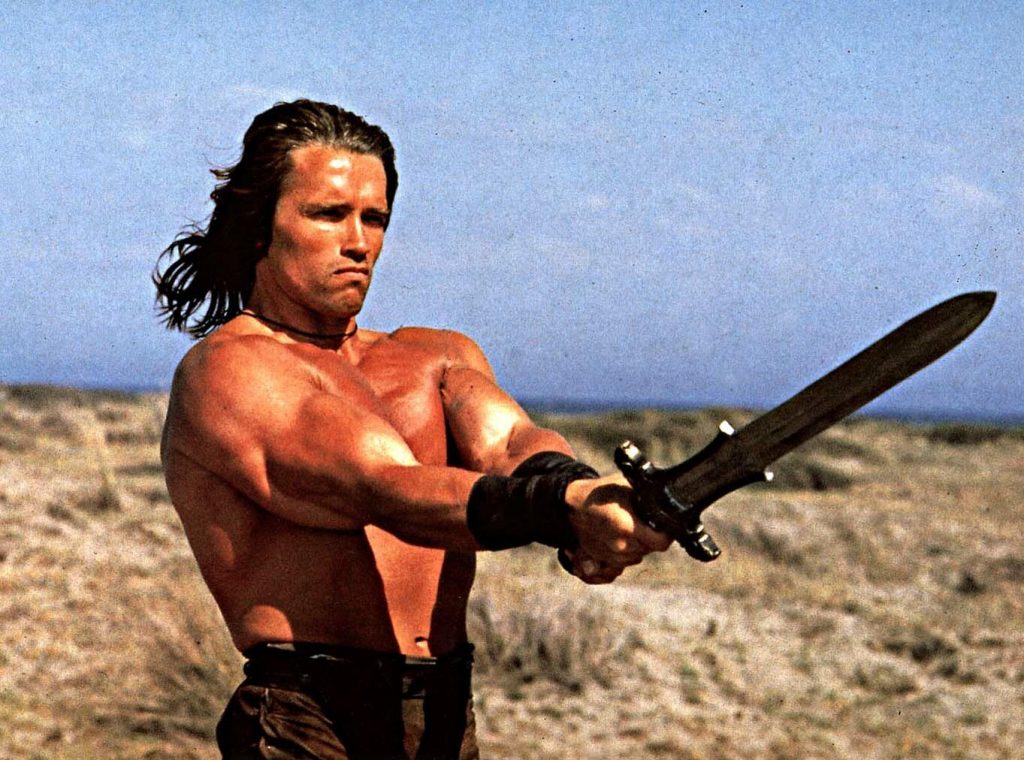
If you imagine Conan’s claims about his own deeds as nothing but wild bragging, and measure him only by the events Howard actually depicted, he’s a totally different character. He becomes a plaything of the gods, a hero who helps the world despite himself, led by the nose from adventure to adventure by the false promise of gold, jewels, or supple flesh.
Howard’s intrinsic decency shines through Conan’s supposed amoral selfishness, and it’s this contradiction that gives the character the power and enduring popularity that he still has today. Conan is the perfect bad-boy, all sullen, smouldering blue eyes and pantherish muscle, boasting endlessly about all the people he’s beaten up and the crimes he’s committed, but who still takes pains to help his elderly neighbour with her shopping when he thinks no one is looking. And we still love him for it.
Bran Mak Morn
The last king of Howard’s Picts was something of a racial throwback. In real history, the name was used by the Romans to refer to a tribe of late Iron Age people who lived in northern and eastern Scotland. It’s usually assumed that they were descended from the Caledonii, Britons from the Celtic diaspora across Europe who’d been forced North by the Roman invasion.
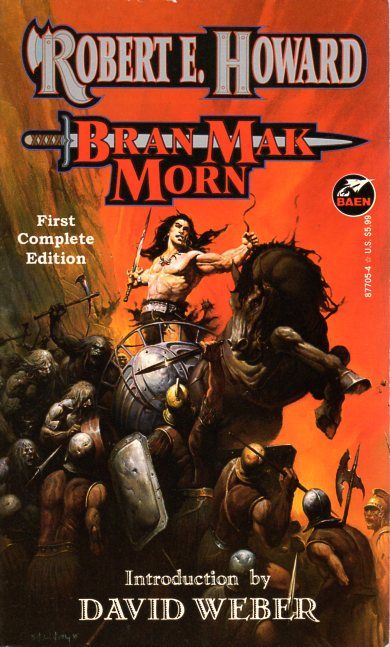
In Howard’s vision, the Picts were contemporaries of Kull, island folk from the Western Ocean. They survived the final sinking of Atlantis and Valusia, but suffered significant cultural decline down through the following centuries, appearing occasionally in Conan stories as half-wild foes. By the time of Bran, somewhere around the 3rd century AD, they had been pushed into the wilds of northern Scotland, where they became ignorant, and interbred with the locals. Bran himself is said to be a descendant of Brule the Spear-Slayer, who was King Kull’s greatest friend.
Unlike his people, Bran was a return to the Pictish elder stock, taller, brighter, a better warrior. By comparison, those around him were short and twisted, ferociously strong but almost caveman-like, with gnarled limbs and small black eyes. He was a one-off, the high-point of his people, and although he tried to build them up and help them regain their lost glory, he knew that their time was done. He recognised the futility of his calling, that his people were doomed and his reality was a small bubble in the mad chaos of life, and yet he fought for their future because it was his job. His life was one of service to his people, to try to prepare them for what was to come. Whether or not this was possible was of absolutely no relevance.
After Bran’s death, his debased people made him into a god. Part of his consciousness was preserved in a statue, and he was worshipped as the Dark Man. A cult to him even survived down through the centuries, with his idol and its cultists surfacing again in “Children of the Night,” a Lovecraftian horror story set in the 1930s.
Solomon Kane
The closest of Howard’s pure fantasy characters to contemporary times, Solomon Kane was born in south-west England some time during the 16th century. A devout puritan, he entered the merchant navy to flee religious persecution and rose to the rank of captain, eventually even spending some time as a buccaneer against the Spanish. The skills he acquired during this period became the foundation for his lifelong crusade against evil in all its forms.
An utterly serious individual, relentless and driven, Kane embodied puritan wrath. His physical presence reflected this – tall, graceful, wolfishly lean, with long limbs and iron muscles under his plain black clothing, and a long, melancholy face. He possessed the astonishing vitality and strength common to most of Howard’s characters of course, and was both a dead-shot and one of Europe’s greatest swordsmen. The pulps demanded no less than physical exceptionalism. Unlike some of the other characters however, his primary drive was to simply seek out evil, supernatural or otherwise, and end it.
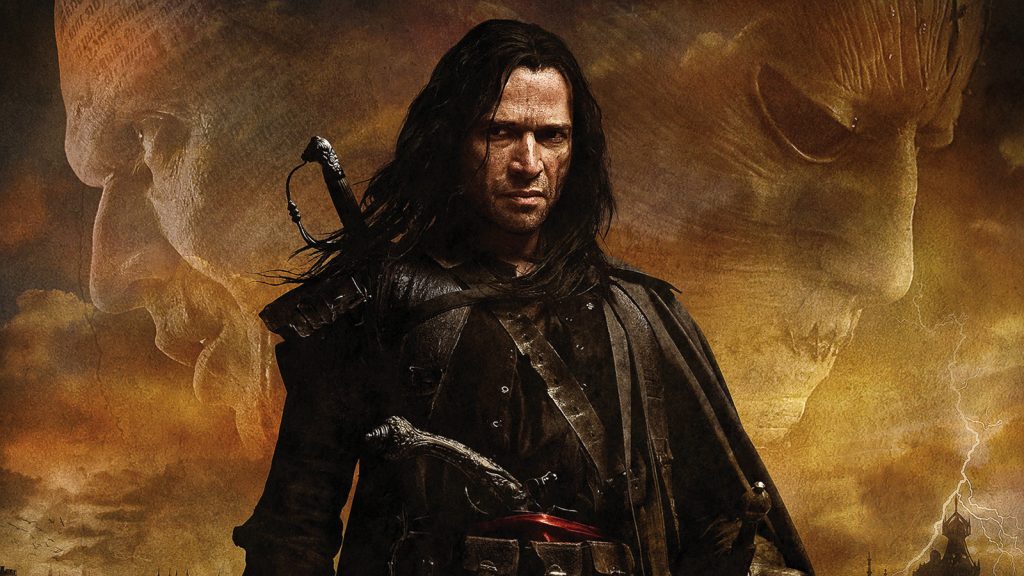
Looking at the stories, it’s no stretch to describe Kane as demented. He’s not just a fanatic, he actually believes himself to be the instrument of God’s vengeance. Despite his piety, he carries a magical staff out of antiquity, a gift from his witch-doctor friend that later proves to be the Staff of Solomon. He justifies his wanderlust and his deep need for the thrill of adventure as a continual hunt for righteous causes as guided by God himself. There is nothing else of importance to him, and sometimes this allows his urge to deliver justice to drive him into near-suicidal foolishness. Fortunately, his burning hatred of evil and the iron rage it kindles always permit him to win through.
But is it actually madness if he’s right? The stories never answer the question either way, but in his last appearance, a poem, he is old, returning home to contemplate a retirement. He does not get there. Instead, he turns around and heads away again, giving even his old age to his endless crusade.
John Kirowan
The primary character for many of Howard’s contributions to the Cthulhu Mythos was Professor John Kirowan, whose adventures were set in the modern day – that is, around the time of publication in the 1930s. Kirowan was a tall and slender Irishman from Galway, the son of local gentry. Always attracted to dark secrets, he was alienated from his parents, and his main anchor to the everyday world was his twin sister Moira, a laughing, joyful girl.
In his youth, he found his way to Hungary in pursuit of deep occult secrets. There, he met a man named Vrolok, and the two studied together for a time. As Vrolok sank deeper into dark magic, Kirowan abandoned him. In revenge, Vrolok corrupted Moira, who had come to Hungary, and set her against her brother. Kirowan and Vrolok fought inconclusively, and after Kirowan fled, the Hungarian abandoned Moira, who killed herself.
Deeply scarred, perpetually sorrowing, Kirowan swore vengeance on Vrolok and travelled the world in search of sufficient occult power to defeat the man. Eventually, sickened by the debauchery of the occult, he swore off and moved to America. Here he joined an eccentric organisation called The Wanderer’s Club. In the company of his close friend and fellow Wanderer’s Club member John Conrad, Kirowan turned his learning against sources of cult and occult menace. Eventually, he even managed to get his revenge on his enemy.
While he is still unusually strong and resilient, Kirowan is interesting as a more intellectual hero than many of Howard’s other creations. He is haunted by his past and his guilt about it, but not to a crippling degree. He engages with the world to an extent, even as he remains prepared to turn the knowledge he has gained to good ends. Of course, part of the nature of the mythos is that brawn is rarely enough, but even so, it is easy to find hints of Howard himself in the tall, saddened professor.
El Borak
Howard created the character of Frank Gordon when he was just ten, but the Francis Xavier Gordon who finally saw print was a considerably more sophisticated beast inspired by Lawrence of Arabia, Sir Richard Burton, and Gordon of Khartoum. The El Borak stories are pure adventure, free of romantic history and with (almost) no hint of fantasy.
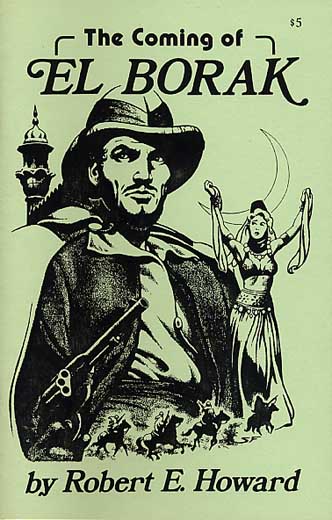
A gunslinger of Scottish and Irish ancestry from El Paso, Gordon traveled the world in his youth, eventually settling in Afghanistan. A short, slender man, his greatest asset was his speed – he was a lightning-fast gunman and knife fighter, but also a very quick thinker. It was this characteristic that earned him his nickname from the locals, for El Borak translates to the Swift. He devoted much of his time to keeping the peace in the country, trying to avert wars and catastrophes, and to right injustices.
Whilst Gordon’s adventures in the Middle East are purely adventure stories, the pulp adventure genre rewarded writers for taking significant liberties with what was actually plausible. So in one tale, he stumbles across a lost civilisation peopled by the remnants of the army of Alexander the Great while trying to prevent a war with India. In another, he’s attempting to save the life of a woman who has presented herself as a goddess to the people of a forbidden city – not from her worshippers, but from her abandoned husband. Even in his more realistic fictions, Howard was a devout lover of the fantastical.
Kirby O’Donnell was a minor second American adventurer in Afghanistan, created in El Borak’s mould. The main point of divergence between the two is motivation – while Gordon is dedicated to regional stability, O’Donnell is a treasure-hunter seeking wondrous ancient loot.
Sailor Steve Costigan
The hero of a whole host of humorous boxing stories, Steve Costigan was one of Howard’s most financially successful characters. The stories were firmly in the tall tales mould, characterised by misdirection, understatement, exaggeration, and unreliability.
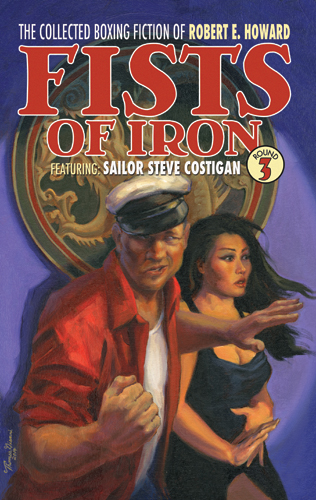
The folk art of the tall tale is a subject all of its own, a deeply-embedded part of the Southwestern American psyche, and Howard grew up surrounded by expert yarn-spinners. The great success of his humorous work is a testament to his facility with the art. Costigan was such a popular character that Howard had to eventually rename the character to Dennis Dorgan in a few stories written for rival magazines to his usual venues.
Steve Costigan was an enthusiastic life-long boxer. Born in Galveston, Texas, he was of Irish descent. He had a younger brother, Mike, who was also a boxer, and even more successful than Steve was. Once he reached fourteen, Steve took to the sea. He signed on to the merchant ship Sea Girl out of San Francisco at seventeen, and quickly attained the rank of able seaman. Despite stints on other vessels, the Sea Girl was always his home.
Costigan’s most reliable companion was a bulldog, named Mike after his brother, whom he adopted as a stray while in Dublin. Other common characters from the Sea Girl included Bill O’Brien, another boxing Irish American and Steve’s best friend; Sven Larson, a Swedish sailor who was forever trying to take the title of ship’s champion from Costigan, and Mushy Hanson, a Danish boxing sailor who writes poetry and collects cheap novels.
The eternal underdog, Costigan lacks the skill, strength and reflexes found in many of Howard’s other characters. Like the Iron Men of the boxing world who inspired him, Costigan’s sole fighting virtue is sheer stubbornness – he soaks up punishment like a sponge, and refuses to give up. He’s quick-tempered and ignorant but big-hearted, the perpetual dumb sucker who falls victim to every hard luck grift he encounters. Even if he never actually seems to get the girl, he still wins his fights with his relentless spirit. As such, he’s the perfect foil for Howard’s humour, and if he never gets the prize he’s after, he’s also very much never the loser.
Breckenridge Elkins
The land-bound counterpart to Sailor Steve Costigan, Breckenridge Elkins was another humorous character embedded in the tall tale genre. However, while Costigan’s stories were boxing tales, the Elkins yarns were Westerns, at least in the broad sense. That brought them closer to the tall tale core, and they were phenomenally popular. Breck was by far Howard’s most commercially successful character, and if he is obscure now, it is only because tall tales have fallen out of favor while fantasy has gone from strength to strength. Like Costigan, Elkins was so popular that Howard was eventually asked to re-skin him, and he also appeared under the name of Pike Bearfield.
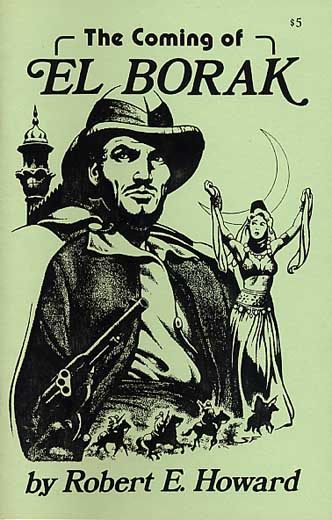
Elkins was a hillbilly, an ignorant, sometimes illiterate giant from Bear Creek, a tiny and imaginary place in the Nevada Mountains, and was usually found with his bad-tempered horse, Cap’n Kidd. Although he was huge and muscular, he was as dumb as a post, and while he was always trying to be helpful to friends and family, he usually succeeded only in adding to his own problems. With a reputation throughout the southwest of the USA for both his short temper and his fierce fighting skills, he was feared and admired in equal parts.
The Elkins stories are classic misadventures told unreliably by the man himself. While he’s happy to talk up his fights and physical challenges well beyond the bounds of any physical possibility, and there’s a great deal of humour in the exaggeration, it is his constant inability to understand the people and situations around him that provide most of the laughs. Inevitably, things get increasingly complicated as he blunders through the story, falling back on his strength and fists to set things straight. As with Sailor Steve Costigan, a common theme of the Elkins stories is his constant failure in romantic affairs.
It’s easy to dismiss tall tales as an outdated whimsy, but the truth is that for years, they were the shared mythology of the people who transplanted themselves into the American Southwest. In a time before radio, when books were scarce, and life much the same day to day and month to month, tall tales were the heart of the oral tradition, a survival of the same literary strand that gave us Hercules and Achilles. A good ‘Tall Liar’ was, quite literally, a community treasure.
Elkins provided Howard with the opportunity to tap directly into that vein of story that had surrounded him for his entire life. It may be that in those yarns, his deepest, most genuine voice was finally able to find expression.
Look for the next installment in the Life and Times of Robert E. Howard series in a couple of weeks. We’ll dive into Howard’s timelines then.

Tim Dedopulos
Tim is an author, publisher, and game designer with tons of experience. He’s writing the Life and Times of Robert E. Howard series for Conan.com.


